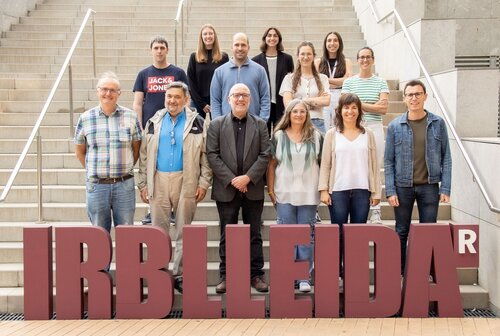Gut microbiome key to developing new diagnostics and treatments for ALS
A study from Lleida reveals that the intestinal microbiota could play a fundamental role in Amyotrophic Lateral Sclerosis
A new study has found that people diagnosed with recent-onset Amyotrophic Lateral Sclerosis (ALS) have a higher abundance of Fusobacteria and Acidobacteria bacteria. This discovery suggests that the gut microbiome could be a determining factor in the investigation of new strategies for the diagnosis and treatment of this neurodegenerative disease. The research, carried out by the Metabolic Physiopathology research group of Lleida, in collaboration with the Neurology Service of the University Hospital of Bellvitge, has been published in the journal Scientific Reports.
The study was carried out with the participation of 16 people diagnosed with ALS, compared with a group of 12 healthy individuals. The main objective was to evaluate the differences in the gut microbiome of ALS patients diagnosed between 6 and 15 months after the onset of the first symptoms, compared to healthy individuals. 'This research shows that ALS patients have different characteristics in their gut microbiome, with a special focus on short-chain fatty acids (SCFAs), lipids that may act as mediators in the patient's metabolism. Even so, it is not yet clear whether these differences are a cause or a consequence of the disease, and more research is needed to determine their potential as diagnostic or therapeutic targets,' explained lead researcher and lecturer at the University of Lleida, Victòria Ayala.
The next steps in this line of research include lipidomic analysis and the extension to more patients, which will identify whether lipids are involved in the pathogenic mechanisms of ALS. This will help to better understand how lipid imbalances may influence the microbiome and metabolism, thus contributing to the development of the disease.
Currently, there is no effective treatment for ALS, as the mechanisms of the disease are still unknown. ALS manifests in adulthood and has a median survival of three years. Patients progressively lose mobility, with a fatal outcome due to the death of neurons responsible for movement control.
This research has been funded by the Instituto de Salud Carlos III (PI20/000155 and PI23/00176), the Generalitat de Catalunya (2021 SGR 00990), the Miquel Valls Foundation (Jack Van den Hoek donation), FUNDELA, and RedELA funding.
Reference article: Fontdevila, L., Povedano, M., Domínguez, R. et al. Examining the complex interplay between gut microbiota abundance and short-chain fatty acid production in amyotrophic lateral sclerosis patients shortly after onset of disease. Sci Rep 14, 23497 (2024). https://doi.org/10.1038/s41598-024-75083-z

Metabolic Physiopathology research group of Lleida






